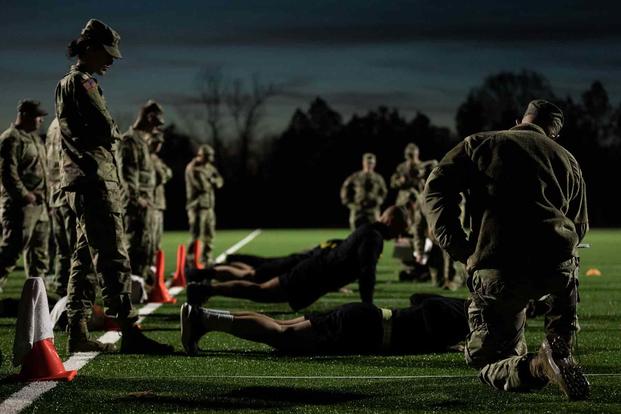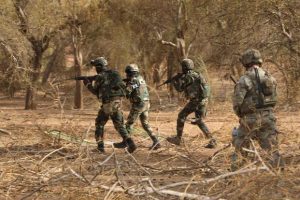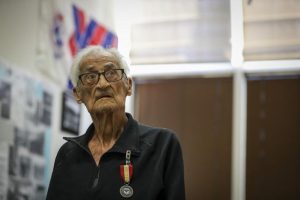The death of a soldier and the hospitalization of another last week at Camp Shelby, an Army base in Mississippi, may have been caused by a combination of hot weather and the service’s fitness test, as record-breaking heat waves torch much of the U.S.
A junior enlisted Illinois National Guardsman died Friday at the base right after completing the Army Combat Fitness Test, or ACFT. Spc. Nathaniel Jefferson, 38, collapsed after finishing the two-mile run, the final part of the six-event test. He was pronounced dead at a local hospital, a base spokesperson told Military.com.
The cause of death was unclear Thursday, but one source with direct knowledge of the situation said Jefferson had symptoms associated with heat-related injuries.
Another soldier at Camp Shelby was hospitalized the following day, prompting the base to curtail many outdoor training activities after the back-to-back incidents.
The 18-year-old soldier, who suffered hot weather injuries during a separate ACFT, was in the Mississippi’s Recruit Sustainment Program, or RSP — Detachment 3, Bravo Co., where newly enlisted Guardsmen train on Army fundamentals during weekends before being shipped off to basic training.
The soldier, who was not identified by the Army, was still recovering in the hospital on Thursday.
The temperature in the area hit record-breaking temperatures of around 102 degrees Fahrenheit on Friday. However, the ACFT Jefferson conducted was at 6 a.m., when temperatures were in the low-80s, but the humidity level was at 90%.
Most of the Army’s fitness test can be conducted indoors, but Camp Shelby’s gym does not have an indoor track for the run.
The Army’s policy on facilitating the ACFT forbids the test from being conducted when the weather or other environmental conditions can hurt athletic performance, though the specifics are vague and generally up to a commander’s discretion.
High humidity levels make it harder for the body to cool down and can reduce blood flow to the muscles and spur the cardiovascular system to be overtaxed, studies show. The humid air also raises the body’s temperatures and tires it much more quickly than drier air.
The back-to-back incidents prompted a safety stand-down that is still in effect at Camp Shelby, prohibiting organized outdoor physical fitness training between 7 a.m. and 8 p.m.
“Leaders are consistently evaluating weather conditions and performing risk assessments to measure and prevent further heat injuries to safeguard our service members and ensure we are always ready and always there for the Mississippi communities in which we serve,” Lt. Col. Deidre Smith, a Guard spokesperson, said in a statement.
Jefferson, a tactical power generation specialist, was participating in the Basic Leader Course, or BLC, run by the 154th Regiment Regional Training Institute. That 22-day course is mandatory for soldiers to hold the rank of sergeant. Part of the course’s requirements is to pass an ACFT.
Jefferson was assigned to the Illinois National Guard’s 710th Medical Company Area Support. His awards include a State Active Duty Ribbon and three Army Achievement Medals.
Despite the death and injury — and even as the stifling heat waves affect large parts of the U.S. — heat-related injuries may be on a downward trend in the Army.
In July 2019, there were 430 reported heat injuries in the service, but in July 2022, there were 275, according to internal data reviewed by Military.com.
However, the data does not include the National Guard, and heat injuries are likely underreported.
The service has implemented some minor changes in how soldiers cool down during training, such as having tubs of ice for soldiers to dunk their arms in at Fort Moore, Georgia. That base, located in the humid South and home to the basic training schools for infantrymen and cavalry scouts, has among the highest rates of hot weather injuries.
Rising temperatures as a result of climate change is a key concern for Army planners as they move forward on soldier welfare and training. Joint Base Lewis-McChord, Washington, known for its mild Pacific Northwest summers, has authorized soldiers to buy portable air conditioning units and has long-term plans to build new barracks with air conditioning, a luxury that until recent years was uncommon in the Seattle area.
Editor’s note: This story has been updated to correct the approximate temperature during Jefferson’s testing.
— Steve Beynon can be reached at Steve.Beynon@military.com. Follow him on Twitter @StevenBeynon.
Please rate this CIBA article
Vote






